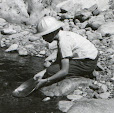The print edition of The Wenatchee World for Thursday, December 13, carried an article on page B7 titled, "1872 law still saving miners from paying public-land royalties." (The online version of the article was available at the time of writing at the link here.)
The focus of this article, which is attributed to the Chicago Tribune, is an unspecified piece of legislation co-sponsored by Arizona Representative Raul M. Grijalva (D) that would require those who mine hard-rock deposits of gold, silver, copper and other minerals to pay a royalty of 12.5% to "fix" what the paper quotes Grijalva as calling, "this big hole in the federal government's revenue stream."
A search of the Chicago Tribune website failed to turn up the exact article appearing in the World, although there were several pieces on the subject. A search of THOMAS turned up one bill dealing with mining that was co-sponsored by Representative Grijalva: H.R.3446, Fair Payment for Energy and Mineral Production on Public Lands Act.
Introduced over a year ago, on November 16, 2011 by Massachusetts Representative Edward J. Markey (D), H.R.3446 is very much like H.R.2262 and its ilk reported on by this writer in 2008-9 here, here, here, and here. A re-reading of the main points of H.R.2262 presented in the aforementioned posts would do much to educate the reader regarding H.R.3446, the principal difference being the latter's imposition of a 12.5% royalty rate on all mines as opposed to the earlier bills' rates of 4% for existing mines and 8% for new ones.
Below is this writer's summary of some of the noteworthy provisions of H.R.3446, together with the pertinent sections, derived from a cursory scan of the bill's text:
1. Casual use, which is exempted in the bill, includes hand panning and non-motorized sluicing - SEC. 502. (a)(4)(B) but not suction dredging - SEC. 502. (a)(4)(C).
2. Establishes a royalty of 12.5% of the gross income from mining - SEC. 511. (a)(1).
3. Requires recordkeeping - SEC. 511. (c) and establishes audits - SEC. 511. (d).
4. Penalties for failure to comply with the royalty requirements are the same as under the Federal Oil and Gas Royalty Management Act - SEC. 511. (k).
5. Specifies which lands are open to mineral location - SEC. 521. (a) and which are not - SEC. 521. (b).
6. Requires permits for other than casual use mineral activities - SEC. 532.
7. Requires a permit for exploration - SEC. 533.
8. Requires a permit for operation - SEC. 534.
9. Requires the posting of "financial assurance" payable to the United States for reclamation - SEC. 536.
10. Establishes "user fees" for mineral activities - SEC. 542.
11. Establishes inspection and monitoring requirements - SEC. 543.
12. Judicial review of regulations implementing this bill may only be made in "the United States Court of Appeals for the District of Columbia." - SEC. 545. (b)(1).
13. Penalties for violations of permit requirements or regulations are up to $25,000 per violation per day - SEC. 546. (d)(1) and $1,000 per violation per day for failing to correct a violation - SEC. 546. (2).
14. Federal agents may without notice enter any premises to inspect records - SEC. 552. (d)(1) and may stop and inspect any vehicle suspected of carrying locatable minerals whether on a mining claim - SEC. 552. (4) or off - SEC. 552. (5).
Like the earlier legislative proposals, this one is claimed by its proponents to target the hard-rock mining operations of the large corporations while in reality sweeping all mineral activities except the most miniscule so-called "recreational" placer mining into its maw.
Equally fallacious is the claim by Representative Grijalva that the income to the federal government generated by this legislation would constitute a "fix" for a "big hole" in the government's revenue take. The World article quotes a GAO report to the effect that "the sales value of hard-rock minerals from federal land (was estimated) to be about $6.41 billion in fiscal year 2011." Applying 12.5% of this putative $6.41 billion to the government's acknowledged $16.3 trillion debt is equivalent to a man with a $100,000 mortgage making an additional annual payment of $4.92.
Rather than solve the federal governments budget crisis, passage of H.R.3446 would render almost all small-scale mining operations cost-ineffective, thereby increasing unemployment and economic hardship. After all, it is not the individual gold miner with his small, gasoline-powered dredge who is responsible for the economic death-spiral in which this country finds itself; the real culprit is the unconstitutional Federal Reserve system which, over the past 99 years of its existence, has counterfeited away over 95% of the dollar's value and with it the financial well-being of the American people. Rather than sucking more of the life-blood out of our already sick economy, Representatives Markey, Grijalva, and their cohorts should concern themselves with measures to solve rather than exacerbate our economic problems. But that, as the saying goes, is another story.
At the time of this writing, H.R.3446 remains in the House Subcommittee on Energy and Mineral Resources. Interested parties can follow its progress (or, hopefully, lack thereof) here.
For those interested in the text of this legislation, follow the link here.
In addition, the websites of the two representatives mentioned in this story are linked here should anyone wish to contact them with an opinion: Congressman Raul Grijalva; Congressman Ed Markey.
Subscribe to:
Post Comments (Atom)

No comments:
Post a Comment